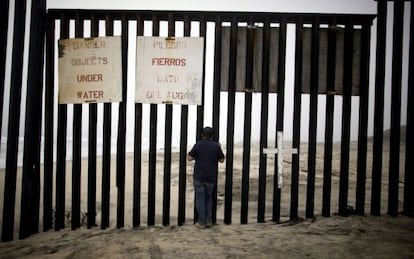Tijuana’s latest wave of criminals: ex-convicts from US prisons
Repatriated felons commit one in every three crimes that take place in Tijuana, Mexican authorities say

Jesús Leal Gallardo, Nicolás Solórzano and Rodolfo Becerra arrived in Tijuana in early 2012. All three men had spent some time in prison. On January 13th, soon after they arrived, they went out to celebrate. They entered a bar around noon. The festivities resulted in a death. Solórzano aimed at and shot a man various times in the face.
They are not the only ones. Local police estimates that at least 20 former inmates, deported from the United States, have killed a dozen people in the first six months of this year. These ex-convicts are responsible for one out of every three crimes committed in the city. According to official records the criminals gained their freedom in exchange for crossing the border.
They say that they arrive at night. More than half of the 225,000 Mexicans expelled from the United States have been in jail. Mexican officials say US police officers bring them to the border and, without offering further information about their criminal records, drop them off.
The emergency situation is such that the Government of Baja California has asked that the Mexican Foreign Ministry make a formal complain to the United States and that American officials warn Mexican authorities of the threat level of the ex-convicts they repatriate.
Alberto Capella, Secretary of Public Security in Tijuana, revealed that 7,0000 ex-convicts have entered the city this year through San Ysidro, the busiest checkpoint in the world and where Tijuana meets San Diego. A review of the Tijuana newspapers supports his claims. The police in Baja California arrested three subjects last week, two of whom were supposed members of the powerful gang, Mafia Mexicana (MM). Officials charged them with levantones or flash kidnappings and murder.
The state of California is following a policy similar to one Texas applied in 2010 in Ciudad Juárez. It provided for the deportation of nearly 6,000 convicts in exchange for conditional freedom. The law would save taxpayers "more than 213 million dollars" in prison maintenance fees. The federal government of Mexico negotiated with the United States to stop the policy and with it they were able to "contain the violence."
The Obama administration has broken the record for deportation of illegal immigrants - at least 1.4 million persons were expelled in 2009. Along with the suspension of the Mexican programs that gave support to those expelled so that they could return to their hometowns ( in the case of Texas, only 10 per cent had lived where they were dropped off) the rate of deportation has aggravated the problem.
The weekly magazine Zeta pointed out in 2006 that "two or three" Mexican ex-convicts from US prisons arrived in Tijuana every day. According to the current data from the Secretariat for Public Security that number has climbed to 35. Agreements on immigration do not put a timeline on deportations for those who have not been convicted of a crime as is the case for former inmates - a policy that Capella says US officials do not follow.
The National Institute of Immigration in Mexico reports that Tijuana absorbs about 20 to 30 per cent of deportations.
Translation: Dyane Jean François
Tu suscripción se está usando en otro dispositivo
¿Quieres añadir otro usuario a tu suscripción?
Si continúas leyendo en este dispositivo, no se podrá leer en el otro.
FlechaTu suscripción se está usando en otro dispositivo y solo puedes acceder a EL PAÍS desde un dispositivo a la vez.
Si quieres compartir tu cuenta, cambia tu suscripción a la modalidad Premium, así podrás añadir otro usuario. Cada uno accederá con su propia cuenta de email, lo que os permitirá personalizar vuestra experiencia en EL PAÍS.
¿Tienes una suscripción de empresa? Accede aquí para contratar más cuentas.
En el caso de no saber quién está usando tu cuenta, te recomendamos cambiar tu contraseña aquí.
Si decides continuar compartiendo tu cuenta, este mensaje se mostrará en tu dispositivo y en el de la otra persona que está usando tu cuenta de forma indefinida, afectando a tu experiencia de lectura. Puedes consultar aquí los términos y condiciones de la suscripción digital.








































